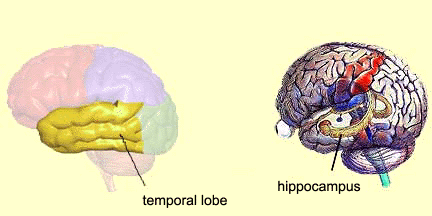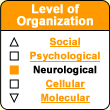| |



| If you place your hands over
your ears, you’ll be covering an area on either side of your head that approximates
the size and location of your temporal lobes. It is in the medial regions of your
temporal lobes–in other words, around the middle of your brain–that
your two hippocampi are located. These two structures are essential for retaining
long-term memories of the episodes in your life. | |
|
| LESIONS THAT CAUSE AMNESIA | | Many of the various types of
amnesia result from the destruction of certain parts of the brain following a
blow or an illness. Damage to the temporal lobes, and
more specifically to the hippocampal
region, is what most often causes amnesia. The
particular form of amnesia varies with the extent of the injury, but in most cases
where the hippocampi are destroyed, people will experience significant anterograde
amnesia that prevents them from remembering anything new from the time of
the injury forward. Memory of events from just before
the accident may also be impaired, but in general, distant memories and other
intellectual abilities remain intact. 
It
was this classic form of amnesia from which the famous
patient H.M. suffered. This man had both hippocampi surgically removed to
quell his disabling epileptic attacks. His case history can help us to better
understand what the specialists call “amnesiac
syndrome”. In particular, his case confirmed the fundamental role that
the hippocampus plays in encoding long-term memories.
|
|





